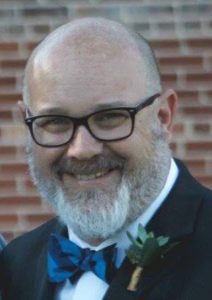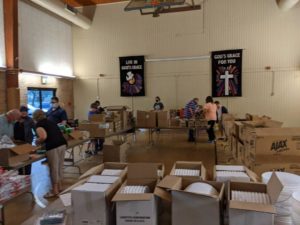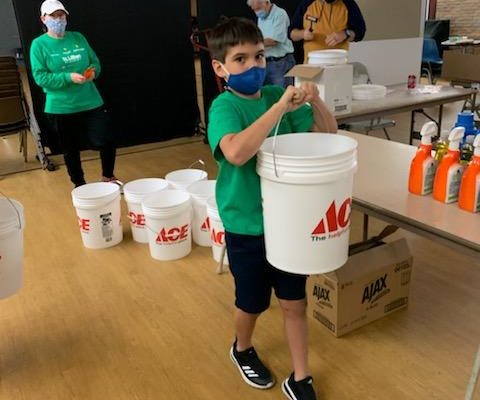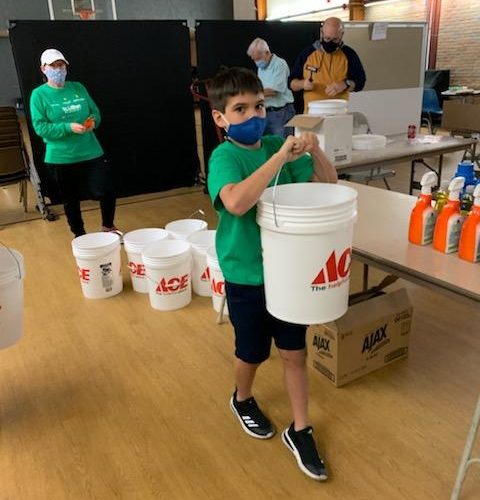A record 2020 U.S. hurricane season combined with the COVID-19 pandemic has created an additional population of victims: eager and skilled disaster-recovery volunteers prohibited from traveling to assist devastated communities.
Many of them are members of American congregations with long histories and deep expertise in providing everything from chaplaincy, feeding, cleanup and rebuilding in the wake of disasters.
Nowadays, most of their equipment trailers are parked in driveways and church parking lots while volunteers — often seniors most vulnerable to the coronavirus — agonize about those who have lost much, if not all, to the 12 named storms that made landfall in the United States last year. They are often left with praying and contributing money.

Bobby Rayburn
“It hurts their hearts not to be able to do more,” said Bobby Rayburn, associate pastor of young families and the disaster response organizer at Broadmoor Baptist Church in Baton Rouge, La.
But given the nearness of Lake Charles, La., a coastal community hit directly by two hurricanes in 2020, Broadmoor was determined to do more even if it could not deploy its seasoned disaster relief volunteers. It reached out to its Cooperative Baptist Fellowship network and was soon connected with the National Baptist Convention of America, which has a strong presence in Lake Charles and the rest of the state.
Soon, a small army of volunteers in Baton Rouge was assembling “cleanup buckets” designed to provide recovery supplies to storm victims in Louisiana and the Florida Panhandle.
“You have to think outside the box if you can’t do hands-on kinds of things,” Rayburn said. “We knew we had to get creative because we couldn’t help in the ways we would normally help.”
Rayburn spoke with Baptist News Global about Broadmoor’s efforts to respond to disaster in the midst of a pandemic.
Was there any damage to Broadmoor during last year’s hurricane season?
To our church? No. Baton Rouge was constantly in the middle of the all the storms that came through. There was one after another after another, but we were never hit. We were in the cone I don’t know how many times. It was enough to cause a lot of stress, but we were fine.
How would you describe the disaster response culture at Broadmoor?
It’s one of those things that when the storms come up, we just do whatever needs to be done. Thinking back to (Hurricane) Katrina (in 2005), we housed Red Cross volunteers who were in town to help others. We have done things like that and also provided a lot of heavy labor to help those who have been affected. Hurricane Gustav (in 2008) was a storm that hit Baton Rouge and Broadmoor really hard. I was without electricity about 19 days. Everyone stepped up and helped each other and the community. We had the historic flood here in 2016. It affected over 50 families within our church, but we still housed groups that came in to help with that recovery. A lot of our older members helped monetarily and still provided labor when and as they could — just as they and others in our church have done since and are doing now. We always have groups who pray for those in need. We try to provide for the spiritual, physical and financial needs of those impacted by these events.
What was Broadmoor’s connection to the Lake Charles area prior to the 2020 storm season?
We had some church members who have family there. It’s not too far from us. About 2½ or three hours. We had people who went to school there and people who have families who live there. We learned a lot about the needs from those folks and through our connections with Kyle Kelley at CBF Louisiana.
Is that how the congregation became connected with NBCA?
Yes, it was through Kyle and CBF Louisiana that we started working with the convention and Greater St. Mary Missionary Baptist Church. That church became a hub for the work CBF Louisiana is doing there. But the church itself was hit pretty badly, as well. Eventually we had to move operations to another church because they were without electricity. But once we connected with that church, they became a great source for information and further connections to those in need. And it was through them that we dropped off our first batch of buckets.
How did the cleanup buckets idea come about?

Volunteers assemble cleanup buckets at Broadmoor Baptist Church in Baton Rouge.
When disasters like these storms happen, we go through our channels, always starting with CBF Louisiana. Sometimes we do things on our own depending on location and what we are able to do. Since we were not able to send people there because of coronavirus going on, and that being a fear and worry for people, staff got together and talked to the missions committee and one of the things that came up was putting these buckets together. For the first round we had 80 buckets, all funded by members of the church. That was about $7,500. We worked with a local Ace Hardware in Baton Rouge for the materials. And we got together to put the buckets together in August. Members of our church partnered with a school, St. Lillian Academy, which meets in our building.
Is the school a ministry of the church?
No, St. Lillian Academy is a separate entity that uses our building. The school operates here five days a week. They are a school for special needs kids from elementary to high school. With all these storms impacting our state, we asked if they would like to help us with the buckets project, and one day we got together and stuffed the buckets with all these supplies.
What goes into them?
Washing detergent, soap, spray disinfectant, rope, gloves, masks, clothes pins, cleaning towels, scrubbing towels. Things like that. It’s all for cleaning up dirty spaces or water damage so people can start the cleaning and rebuilding process. They are 5-gallon buckets with lids on them. To prepare them we just form an assembly line, and everybody grabs an item and stuffs it as it goes by.
Have you held additional bucket days?
We have. We have done it twice. The second time we partnered with Greater Mt. Olive Missionary Baptist Church here in Baton Rouge.
How did that project come about?
During this (pandemic) time we had started an online Bible study and discussion group with our college students and some of their college students. The focus was on relationships and race. During those sessions some of them had the idea of doing some kind of service together. With Lake Charles to the west of us and the badly hit Florida Panhandle to our east, it was clear that our churches were smack in the middle of both those areas. So, the two groups got together on a Saturday morning and stuffed more buckets. They assembled 60 buckets. We sent 20 to Lake Charles and 40 to Florida. It was just a way for students from both churches to get together and to put all the things they were talking about in their Bible study into practice. It just developed and it was perfect.
Are there further plans to help in Lake Charles?
Right now, we don’t have a lot of things planned. School is back in session, and the hard thing for people in Lake Charles and the people in Florida is that the supply of volunteers during COVID is just nonexistent. And you can see the results when you get off the interstate and into the communities and you see there is just not much being done. Without the volunteer help we have seen in previous storms, I can’t even imagine how long it is going to take to recover and I would guess some will never recover. They will just move. They will have to. The area around Lake Charles is just as horrible. So many of the homes are just not liveable.
Is that frustrating to you and others accustomed to being traveling volunteers?
The frustration is we know there are people out there who need our help and we have the ability to help, but we can’t. Some of our folks who would normally travel to volunteer are retired folks, but they are prime targets for COVID and they can’t risk that for themselves or their families. Unfortunately, it’s a perfect storm holding us back and we are just frustrated with the situation.


